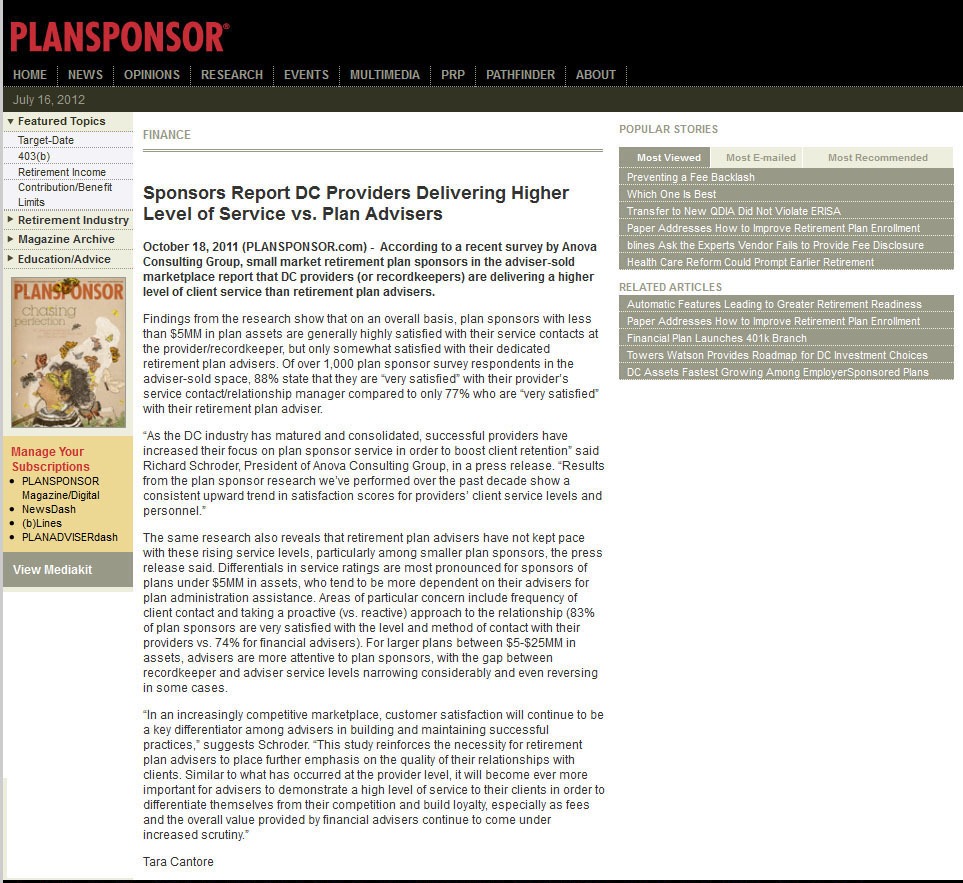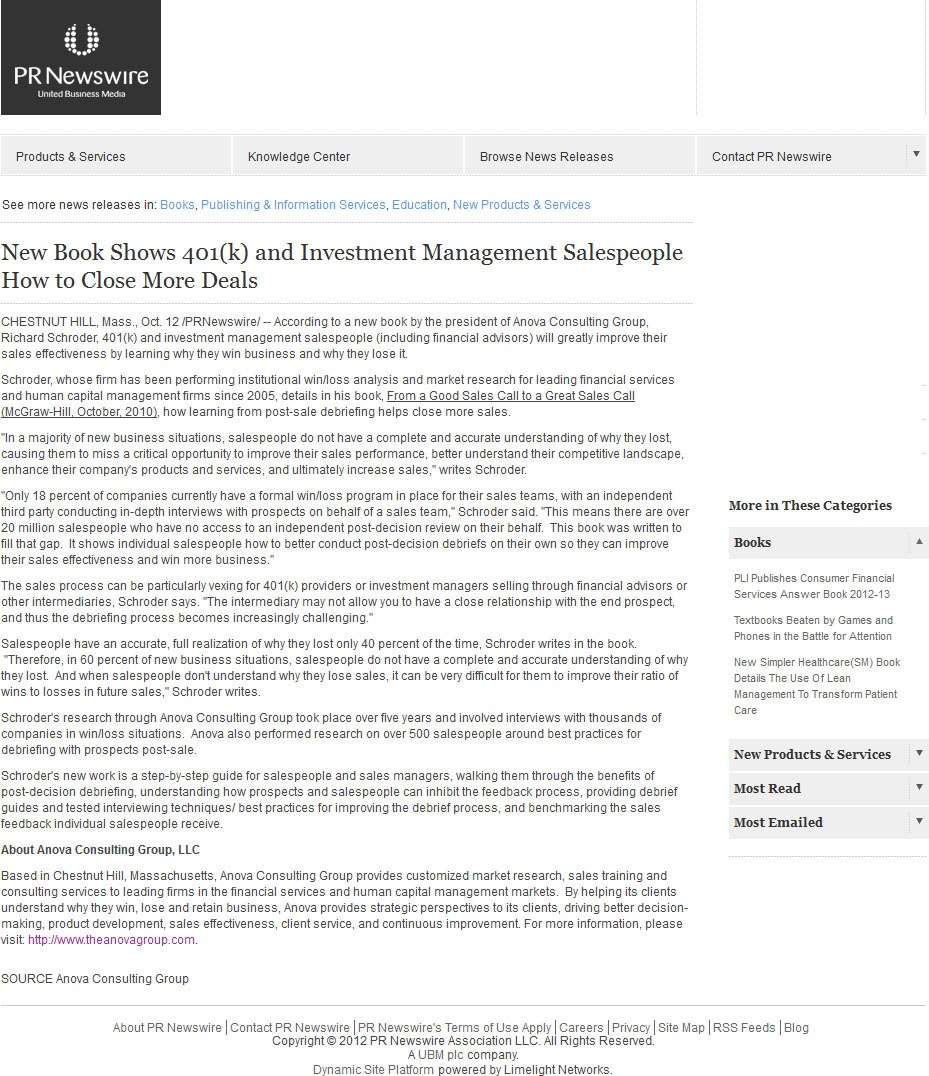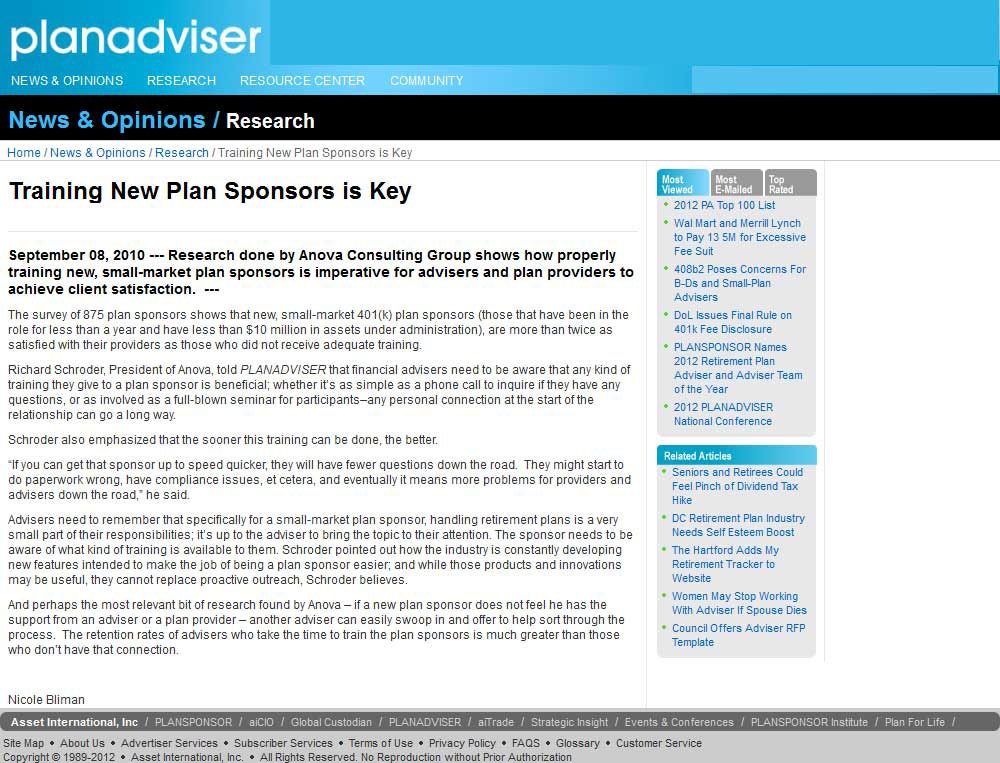
For Immediate Release
Contact:
Andrew Cloutier
Anova Consulting Group, LLC
(617) 731-1045
andrew@theanovagroup.com
BROOKLINE, MASS., April 13, 2016 – Anova Consulting Group, a leading provider of Win / Loss analysis and client satisfaction research to financial services, healthcare, and technology companies, announced today the appointment of an operations analyst, Steven Fantes-Emanuelson.
Steven assists the leadership and research teams with Win / Loss client reporting, content editing, and technology advancement. In addition, he works closely with Anova’s research team in helping to identify trends and creating reports across all programs such as Win / Loss analysis, client satisfaction, and intermediary perception programs.
Prior to joining Anova, Steven worked in the non-profit sector for over 15 years. He has a background in Arts Administration, Theatre Performance, and Theatre Education. Steven is a member of VASTA (Voice and Speech Trainer’s Association) and is an Equity Membership Candidate with Actor’s Equity Association.
“In 2015, Anova added 12 new clients across new industries and increased our total interview output by 35%,” said Richard Schroder, president of Anova Consulting Group. “To sustain our growth, we were looking to add an operational and administrative resource to support our leadership and research teams. Steven’s skills will help Anova continue to efficiently deliver high quality, actionable research to our clients. Client service is Anova’s top priority.”
Established in 2005, Anova Consulting Group is a leading market research and consulting firm focused on win / loss and client satisfaction analysis. By helping its clients understand why they win, lose, and retain business, Anova provides strategic perspectives driving better decision making, product development, sales effectiveness, client service, and continuous improvement. Richard Schroder, Founder and President of Anova, is author of a book titled From a Good Sales Call to a Great Sales Call (McGraw-Hill), which details how learning from post-sale debriefing helps close more future sales.
For Immediate Release
Contact:
Andrew Cloutier
Anova Consulting Group, LLC
(617) 731-1045
andrew@theanovagroup.com
BROOKLINE, MASS., March 17, 2016 – Today, Anova Consulting Group announced the addition of two new Executive Interviewers to its healthcare Win / Loss analysis practice: Lisa Hession-Kunz, Executive Interviewer; and Ellen Murachver, Executive Interviewer.
“In the last year, Anova increased the number of Win / Loss interviews we completed for our clients by 35%. A significant part of this growth happened in our healthcare practice, making it a priority to build out our Win / Loss research team.” said Richard Schroder, Founder and President of Anova.
Lisa joins Anova’s Executive Interviewer team with over 20 years or experience gathering insights to help businesses innovate and improve their processes, products, and services. Her experience ranges from market research and sales enablement to product launches and marketing communications across a variety of businesses and industries. Previously, Lisa was a Product Marketing Manager in the healthcare industry, most recently with Wolters Kluwer and Hologic. Lisa has also managed a variety of marketing, research, and analysis projects with a focus on determining needs and recommending solutions.
Ellen brings over 25 years of experience in medical and social research to her role as Executive Interviewer for Anova’s healthcare clients. Ellen’s career in research began as a consultant to Cornell University’s Department of Human Ecology and the Harvard School of Public Health. She later joined the staff of the Judge Baker Children’s Center, an affiliate of Harvard Medical School and a leader in children’s mental health services and research. Prior to joining the Anova team, Ellen worked at Partners HealthCare, where she used her extensive knowledge of clinical trial operations and human subject research as project manager of numerous trials investigating the innovative use of technology in healthcare delivery.
Established in 2005, Anova Consulting Group is a leading market research and consulting firm focused on Win / Loss research and client satisfaction analysis. By helping its clients understand why they win, lose, and retain business, Anova provides strategic perspectives driving better decision making, product development, sales effectiveness, client service, and continuous improvement. Richard Schroder, Founder and President of Anova, is author of the Win Loss Analysis book titled From a Good Sales Call to a Great Sales Call (McGraw-Hill), which details how learning from Win / Loss analysis interviews helps close more future sales.
You must have prior success selling conceptual services to senior management of mid-to-large size companies in an emerging market. You excel at finding and closing new business and have excellent listening and questioning (consultative selling) skills. You have a strong sense of personal urgency, are goal-oriented, a high achiever, and work well in a team-selling environment. Experience with enterprise technology or software solution selling, healthcare, financial services, human resources / benefits, sales enablement, or consulting helpful, but not required. You must be willing to travel to 25% and have prior earnings of at least $150,000 required.
 WESTWOOD, Mass., December 13, 2005 – NYLIM Retirement Plan Services, a division of New York Life Investment Management LLC (NYLIM), has found that most of its defined benefit clients who moved from an unbundled to a bundled platform during the last several years have seen overall pension service, costs and employee awareness improve since their plan converted.
WESTWOOD, Mass., December 13, 2005 – NYLIM Retirement Plan Services, a division of New York Life Investment Management LLC (NYLIM), has found that most of its defined benefit clients who moved from an unbundled to a bundled platform during the last several years have seen overall pension service, costs and employee awareness improve since their plan converted.
Bundled pension services entail using one provider, such as NYLIM Retirement Plan Services, for most or all of the services necessary to maintain the plan. Such services include administration, investment management, trust, actuarial consulting and employee communications. Under a traditional, or unbundled, model, a plan sponsor arranges and pays for each of these services a la carte, usually from different firms.
For example, according to NYLIM Retirement Plan Services, 84 percent of its pension clients who switched to a bundled environment indicated in a recent study that overall service to their plan had improved. Similarly, 75 percent of these clients questioned said plan administration had improved while 17 percent thought it had stayed the same. Plan administration includes such services as answering participant telephone inquiries, processing payroll feeds and distributing checks to plan beneficiaries.
Sixty-seven percent of plan sponsors in the study said the effectiveness of their service team had been enhanced under a bundled model, while 33 percent reported it had not changed.
Additionally, 73 percent of plan sponsors questioned indicated that investment services, such as investment review and monitoring, the range of available investments, and investment fiduciary support, had improved over their prior provider, while 27 percent said investment services had stayed the same. None reported a decline in service.
Many of NYLIM Retirement Plan Services’ plan sponsor clients also saw a decline in servicing costs associated with their pension plan under a bundled platform. Sixty-seven percent of NYLIM Retirement Plan Services’ defined benefit clients in the study said their pension costs declined versus 25 percent who said the cost had stayed the same and eight percent who said costs had risen.
“Until now, there’s been anecdotal evidence that bundling improves service to pension plan sponsors by enhancing automation, efficiency and plan oversight, but now we have data to back that up,” said Don Salama, managing director of sales, marketing, and product development for NYLIM Retirement Plan Services. “Bringing state-of-the-art, web-based technology to the traditional world of pension plans is clearly revolutionizing this business during a time when plan sponsors want fewer service providers, not more.”
Finally, NYLIM Retirement Plan Services has seen an apparent increase in its clients’ employee awareness of their pension benefits in the switch to bundling. Seventy-five percent of plan sponsors questioned believe employees’ awareness of their pension benefits had improved as opposed to 25 percent who thought it had stayed the same. Employee awareness of a pension plan is important to plan sponsors, who offer this relatively high-cost benefit for reasons that include employee attraction and retention.
The study was performed by Rich Schroder of Anova Consulting Group in Brookline, Massachusetts. Respondents to the study represent more than 90 percent of NYLIM Retirement Plan Services’ pension clients who moved from an unbundled service arrangement to NYLIM’s bundled platform from January 2002 to August 2004. Anova is a market research and consulting firm focused on the financial services industry.
“Although our sample size is small due to the fact that this trend is still emerging, the results of the survey show a lot of potential for growth in the bundled pension market,” said Salama.
About NYLIM Retirement Plan Services
NYLIM Retirement Plan Services provided services to more than 2,100 defined contribution, defined benefit and deferred compensation plans as of October 31, 2005. With offices in Westwood, Massachusetts, and Parsippany, New Jersey, NYLIM Retirement Plan Services administers retirement programs for small, medium and large companies, multi-employer plans, and individuals throughout the United States, and is widely recognized for its leadership in bundled defined contribution and bundled defined benefit plans.
With more than $196 billion in assets under management as of October 31, 2005, New York Life Investment Management LLC and its affiliates provide investment management and related services to a wide range of individual, corporate, public, and Taft-Hartley clients. NYLIM offers institutional asset management, retail investments, retirement plan services, guaranteed products, real estate investments, and alternative investments. For more information, visit NYLIM’s website at www.nylim.com.

October 24, 2011 — Although advisers have a higher approval rating than recordkeeper relationship managers among mid-market plan sponsors, they have been struggling to keep pace in the small-market, according to Richard Schroder, President of Anova Consulting Group. —
Offering an expanded explanation of research released earlier this week, Schroder told PLANADVISER that in Anova’s survey of 1,080 plan sponsors (700 from small plans with less than $5 million in assets and 380 from mid-sized plans of between $5 and $25 million in assets), the small-market sponsors tend to rate their day-to-day relationship manager (RM) at a provider higher than they rate their adviser (see “Sponsors More Satisfied with Providers than Advisers”). The “advisers” in question cover a range of business models, Schroder noted—including those associated with a wirehouse or an independent registered investment adviser (RIA).
“However, when we move up-market, advisers tend to score better than platform relationship managers,” he said. The difference is not as wide in the mid-market as in the small-market though—in the $5-$25 million plan range, advisers’ overall approval rating is about 87%, versus 86% for RMs. So it’s better, but not by much.
The sponsors were asked to rate their adviser and RM on a 7-point scale. The areas they were asked to rate included overall satisfaction, frequency of contact, problem resolution skills, responsiveness, accessibility, proactive approach, and product knowledge. Schroder said the areas in which advisers consistently outperform RMs are in frequency of contact and accessibility.
“The one area where universally people need to improve is on proactively managing the relationship. This is true for all types of service people—advisers and RMs,” Schroder noted. “Generally, service personnel receive ratings that are 10-15% lower in the proactive approach metric versus other metrics like knowledge or responsiveness. They need to get out in front of the sponsor and be proactive to address issues before they blow up.”
As for RMs receiving higher satisfaction ratings than advisers in the small-plan space, Schroder says this has been consistent over the last five years. “Sponsors tend to see the relationship manager at a recordkeeper as a strength. Advisers aren’t exactly a weakness, but they aren’t a strength either,” he said.
Schroder recognized that it hard to assess how much involvement the adviser is trying to have with the small-market plan sponsor when surveying the sponsors. “Some advisers want to be very involved, others want the provider to take care of the clients while they just want to be involved in the higher level needs like investment selection or perhaps education. Others want a hybrid approach. It’s hard to quantify from the sponsor,” he said, suggesting that if an adviser chooses to be more involved with his small-plan clients, he would score better in the survey.
“Small-market providers have done a much better job of improving their service levels and advisers haven’t kept pace,” Schroder observed. “As outsourcing relationships get solidified and more entrenched, and as large-market customization rolls down hill, it’s germinating into better service for the small-market sponsor.”

October 18, 2011 (PLANSPONSOR.com) – According to a recent survey by Anova Consulting Group, small market retirement plan sponsors in the adviser-sold marketplace report that DC providers (or recordkeepers) are delivering a higher level of client service than retirement plan advisers.
Findings from the research show that on an overall basis, plan sponsors with less than $5MM in plan assets are generally highly satisfied with their service contacts at the provider / recordkeeper, but only somewhat satisfied with their dedicated retirement plan advisers. Of over 1,000 plan sponsor survey respondents in the adviser-sold space, 88% state that they are “very satisfied” with their provider’s service contact / relationship manager compared to only 77% who are “very satisfied” with their retirement plan adviser.
“As the DC industry has matured and consolidated, successful providers have increased their focus on plan sponsor service in order to boost client retention” said Richard Schroder, President of Anova Consulting Group, in a press release. “Results from the plan sponsor research we’ve performed over the past decade show a consistent upward trend in satisfaction scores for providers’ client service levels and personnel.”
The same research also reveals that retirement plan advisers have not kept pace with these rising service levels, particularly among smaller plan sponsors, the press release said. Differentials in service ratings are most pronounced for sponsors of plans under $5MM in assets, who tend to be more dependent on their advisers for plan administration assistance. Areas of particular concern include frequency of client contact and taking a proactive (vs. reactive) approach to the relationship (83% of plan sponsors are very satisfied with the level and method of contact with their providers vs. 74% for financial advisers). For larger plans between $5-$25MM in assets, advisers are more attentive to plan sponsors, with the gap between recordkeeper and adviser service levels narrowing considerably and even reversing in some cases.
“In an increasingly competitive marketplace, customer satisfaction will continue to be a key differentiator among advisers in building and maintaining successful practices,” suggests Schroder. “This study reinforces the necessity for retirement plan advisers to place further emphasis on the quality of their relationships with clients. Similar to what has occurred at the provider level, it will become ever more important for advisers to demonstrate a high level of service to their clients in order to differentiate themselves from their competition and build loyalty, especially as fees and the overall value provided by financial advisers continue to come under increased scrutiny.”
For Immediate Release
Contact: Andrew Cloutier
Anova Consulting Group, LLC
(617) 731-1045
andrew@anovaconsulting.com
BROOKLINE, MASS., October 18, 2011 – According to a recent survey by Anova Consulting Group, a leading provider of customized market research, sales training and consulting services to financial services and human capital management companies, small market retirement plan sponsors in the advisor-sold marketplace report that DC providers (or recordkeepers) are delivering a higher level of client service than their retirement plan advisors.
Findings from the research show that on an overall basis, plan sponsors with less than $5MM in plan assets are generally highly satisfied with their service contacts at the provider / recordkeeper, but only somewhat satisfied with their dedicated retirement plan advisors. Of over 1,000 plan sponsor survey respondents in the advisor-sold space, 88% state that they are “very satisfied” with their provider’s service contact / relationship manager compared to only 77% who are “very satisfied” with their retirement plan advisor.
“As the DC industry has matured and consolidated, successful providers have increased their focus on plan sponsor service in order to boost client retention” said Richard Schroder, president of Anova Consulting Group. “Results from the plan sponsor research we’ve performed over the past decade show a consistent upward trend in satisfaction scores for providers’ client service levels and personnel.”
That said, the same research also reveals that retirement plan advisors have not kept pace with these rising service levels, particularly among smaller plan sponsors. Differentials in service ratings are most pronounced for sponsors of plans under $5MM in assets, who tend to be more dependent on their advisors for plan administration assistance. Areas of particular concern include frequency of client contact and taking a proactive (vs. reactive) approach to the relationship (83% of plan sponsors are very satisfied with the level and method of contact with their providers vs. 74% for financial advisors). For larger plans between $5-$25MM in assets, advisors are more attentive to plan sponsors, with the gap between recordkeeper and advisor service levels narrowing considerably and even reversing in some cases.
“In an increasingly competitive marketplace, customer satisfaction will continue to be a key differentiator among advisors in building and maintaining successful practices,” suggests Schroder. “This study reinforces the necessity for retirement plan advisors to place further emphasis on the quality of their relationships with clients. Similar to what has occurred at the provider level, it will become ever more important for advisors to demonstrate a high level of service to their clients in order to differentiate themselves from their competition and build loyalty, especially as fees and the overall value provided by financial advisors continue to come under increased scrutiny.”
Established in 2005, Anova Consulting Group is a leading market research and consulting firm focused on Win / Loss analysis and client satisfaction analysis. By helping its clients understand why they win, lose and retain business, Anova provides strategic perspectives to its clients, driving better decision-making, product development, sales effectiveness, client service, and continuous improvement. Last year, Richard Schroder, president of Anova, released a book about Win Loss Analysis titled, From a Good Sales Call to a Great Sales Call (McGraw-Hill, 2011), which details how learning from post-sale Win / Loss debriefing helps close more sales.

CHESTNUT HILL, Mass., Oct. 12 /PRNewswire/ — According to a new book by the president of Anova Consulting Group, Richard Schroder, 401(k) and investment management salespeople (including financial advisors) will greatly improve their sales effectiveness by learning why they win business and why they lose it.
Schroder, whose firm has been performing institutional Win / Loss analysis and market research for leading financial services and human capital management firms since 2005, details in his book, From a Good Sales Call to a Great Sales Call (McGraw-Hill, October, 2010), how learning from post-sale debriefing helps close more sales.
“In a majority of new business situations, salespeople do not have a complete and accurate understanding of why they lost, causing them to miss a critical opportunity to improve their sales performance, better understand their competitive landscape, enhance their company’s products and services, and ultimately increase sales,” writes Schroder.
“Only 18 percent of companies currently have a formal Win / Loss program in place for their sales teams, with an independent third party conducting in-depth interviews with prospects on behalf of a sales team,” Schroder said. “This means there are over 20 million salespeople who have no access to an independent post-decision review on their behalf. This book was written to fill that gap. It shows individual salespeople how to better conduct post-decision debriefs on their own so they can improve their sales effectiveness and win more business.”
The sales process can be particularly vexing for 401(k) providers or investment managers selling through financial advisors or other intermediaries, Schroder says. “The intermediary may not allow you to have a close relationship with the end prospect, and thus the debriefing process becomes increasingly challenging.”
Salespeople have an accurate, full realization of why they lost only 40 percent of the time, Schroder writes in the book. “Therefore, in 60 percent of new business situations, salespeople do not have a complete and accurate understanding of why they lost. And when salespeople don’t understand why they lose sales, it can be very difficult for them to improve their ratio of wins to losses in future sales,” Schroder writes.
Schroder’s research through Anova Consulting Group took place over five years and involved interviews with thousands of companies in Win / Loss situations. Anova also performed research on over 500 salespeople around best practices for debriefing with prospects post-sale.
Schroder’s new work is a step-by-step guide for salespeople and sales managers, walking them through the benefits of post-decision debriefing, understanding how prospects and salespeople can inhibit the feedback process, providing debrief guides and tested interviewing techniques / best practices for improving the debrief process, and benchmarking the sales feedback individual salespeople receive.
For Immediate Release
Contact: Heather Jenkins
Anova Consulting Group, LLC
(617) 731-1085
heather@anovaconsulting.com
CHESTNUT HILL, MASS., October 12, 2010 – According to a new book by the president of Anova Consulting Group, Richard Schroder, salespeople will greatly improve their sales effectiveness by learning why they win business and why they lose it.
Schroder, whose firm has been performing institutional Win / Loss analysis and market research for leading financial services and human capital management firms since 2005, details in his book, From a Good Sales Call to a Great Sales Call (McGraw-Hill, October, 2010), how learning from post-sale debriefing helps close more sales.
“In a majority of new business situations, salespeople do not have a complete and accurate understanding of why they lost, causing them to miss a critical opportunity to improve their sales performance, better understand their competitive landscape, enhance their company’s products and services, and ultimately increase sales,” writes Schroder.
“Only 18 percent of companies currently have a formal Win / Loss program in place for their sales teams, with an independent third party conducting in-depth interviews with prospects on behalf of a sales team,” Schroder said. “This means there are over 20 million salespeople who have no access to an independent post-decision review on their behalf. This book was written to fill that gap. It shows individual salespeople how to better conduct post-decision debriefs on their own so they can improve their sales effectiveness and win more business.”
The sales process can be particularly vexing for salespeople selling through third parties or other intermediaries, Schroder says. “The intermediary may not allow you to have a close relationship with the end prospect, and thus the debriefing process becomes increasingly challenging.
Salespeople have an accurate, full realization of why they lost only 40 percent of the time, Schroder writes in the book. “Therefore, in 60 percent of new business situations, salespeople do not have a complete and accurate understanding of why they lost. And when salespeople don’t understand why they lose sales, it can be very difficult for them to improve their ratio of wins to losses in future sales,” Schroder writes.
Schroder’s research through Anova Consulting Group took place over five years and involved interviews with thousands of companies in Win / Loss situations. Anova also performed research on over 500 salespeople around best practices for debriefing with prospects post-sale.
Schroder’s new work is a step-by-step guide for salespeople and sales managers, walking them through the benefits of post-decision debriefing, understanding how prospects and salespeople can inhibit the feedback process, providing debrief guides and tested interviewing techniques / best practices for improving the debrief process, and benchmarking the sales feedback individual salespeople receive.
Established in 2005, Anova Consulting Group is a leading market research and consulting firm focused on Win / Loss analysis and client satisfaction analysis. By helping its clients understand why they win, lose and retain business, Anova provides strategic perspectives to its clients, driving better decision-making, product development, sales effectiveness, client service, and continuous improvement. Last year, Richard Schroder, president of Anova, released a book about Win Loss Analysis titled, From a Good Sales Call to a Great Sales Call (McGraw-Hill, 2011), which details how learning from post-sale Win / Loss debriefing helps close more sales.

September 08, 2010 — Research done by Anova Consulting Group shows how properly training new, small-market plan sponsors is imperative for advisers and plan providers to achieve client satisfaction. —
The survey of 875 plan sponsors shows that new, small-market 401(k) plan sponsors (those that have been in the role for less than a year and have less than $10 million in assets under administration), are more than twice as satisfied with their providers as those who did not receive adequate training.
Richard Schroder, President of Anova, told PLANADVISER that financial advisers need to be aware that any kind of training they give to a plan sponsor is beneficial; whether it’s as simple as a phone call to inquire if they have any questions, or as involved as a full-blown seminar for participants–any personal connection at the start of the relationship can go a long way.
Schroder also emphasized that the sooner this training can be done, the better.
“If you can get that sponsor up to speed quicker, they will have fewer questions down the road. They might start to do paperwork wrong, have compliance issues, et cetera, and eventually it means more problems for providers and advisers down the road,” he said.
Advisers need to remember that specifically for a small-market plan sponsor, handling retirement plans is a very small part of their responsibilities; it’s up to the adviser to bring the topic to their attention. The sponsor needs to be aware of what kind of training is available to them. Schroder pointed out how the industry is constantly developing new features intended to make the job of being a plan sponsor easier; and while those products and innovations may be useful, they cannot replace proactive outreach, Schroder believes.
And perhaps the most relevant bit of research found by Anova – if a new plan sponsor does not feel he has the support from an adviser or a plan provider – another adviser can easily swoop in and offer to help sort through the process. The retention rates of advisers who take the time to train the plan sponsors is much greater than those who don’t have that connection.